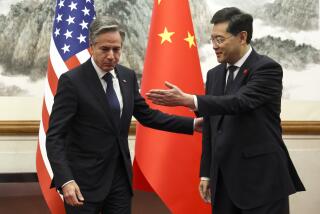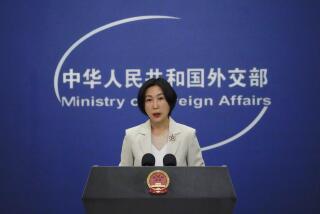China’s New Envoy Has ‘Hearing’ Problem
- Share via
WASHINGTON — When China’s new ambassador arrived in Washington five months ago, he vowed to cut through his country’s legendary bureaucratic tangles and confront complaints about its human rights practices.
But Ambassador Li Zhaoxing’s charm cavalcade took a sharp detour Wednesday. He abruptly canceled an appearance before a House subcommittee because, the Chinese said, somebody had the nerve to call the event a “hearing.”
“Ambassador Li has stiffed the committee,” Rep. Christopher H. Smith (R-N.J.), chairman of the International Operations and Human Rights Subcommittee, told a roomful of spectators who had turned up to watch the lawmakers grill the diplomat.
Later, three Chinese diplomats told a news conference at the Chinese Embassy that Li was eager to talk to Smith and other lawmakers “on an equal footing” but would never consent to be a witness at a hearing.
Smith said that Li, who would have been the first Chinese ambassador to address a formal meeting of a congressional panel, insisted that a list of conditions be met, including a demand that the session should not be called a “hearing”--a word the Chinese said implied some sort of inquisition.
Smith said the committee agreed to all of the Chinese conditions, including, in addition to the ban on the “H-word,” a requirement that Li and the committee members sit at the same table, as opposed to the lawmakers looking down from their usual dais, and that the committee schedule no other witnesses, especially not Chinese dissidents such as Harry Wu or Wei Jingsheng.
But on Tuesday night, the lawmaker said, “after the close of business,” the Chinese Embassy said the agreement had been breached, that the subcommittee had called the session a hearing. Smith said he faxed a denial to the embassy, explaining that no one working for the panel had used the banned word.
On Wednesday, less than an hour before the meeting was scheduled to start, Huo Mingwu, the embassy’s congressional liaison, appeared in person to explain that Congressional Quarterly, a private publication about activities on Capitol Hill, had called the session a hearing in its daily schedule.
Smith said Huo’s explanation was “the most lame excuse possible.”
At the embassy news conference, Huo said that even if the subcommittee did not use the word “hearing,” it did issue a press release referring to Li as a “witness.” Although that term, as used on Capitol Hill, does not usually connote a prisoner in the dock, the Chinese were not mollified.
Huo said Li wanted a dialogue in which both sides could raise any issue.
Smith made it clear that he was planning a session which, whatever it might be called, would not be to Chinese liking:
“We had planned to ask him some very direct and detailed questions about human rights in China, starting with the facts: Did anyone die at Tiananmen Square in 1989? Are there forced abortions in China? Are there political and religious prisoners? Do elements of the Chinese military sell organs harvested from executed prisoners? Where is the 9-year-old Panchen Lama, who was abducted three years ago by agents of the Chinese government?”
Smith, who has never made a secret of his criticism of the Chinese government, said the abandoned session “raises great doubts about commitments made by representatives of the People’s Republic of China.”
Nevertheless, both sides insisted that they were still ready to talk.
Smith said he will meet Li “any time, anywhere . . . tomorrow, this afternoon, later on this week, next week, on Sunday, Saturday, any time.”
Yu Shuning, acting chief of the embassy’s congressional liaison office, said Li is ready to talk to Smith at the embassy, in the lawmaker’s office or anywhere else, with or without press coverage.
But Yu said, “I don’t believe a soap opera in front of cameras is the way to do it.”
Smith issued his invitation to Li after a hearing in June in which Wu and other Chinese dissidents testified. The lawmaker admitted Wednesday that he was surprised when the ambassador accepted.
More to Read
Sign up for Essential California
The most important California stories and recommendations in your inbox every morning.
You may occasionally receive promotional content from the Los Angeles Times.













